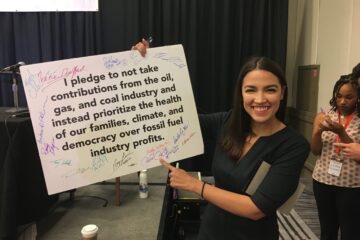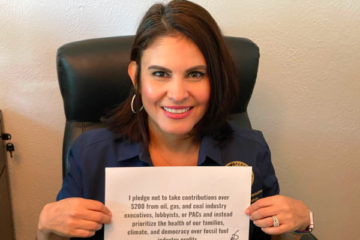The No Fossil Fuel Money Pledge
Are you a candidate and/or elected official interested in taking the No Fossil Fuel Money Pledge? Find out how you can join in the effort to protect the health of our families, climate, and democracy.
The Pledge:
I pledge not to take contributions over $200 from oil, gas, and coal industry executives, lobbyists, and PACs and instead prioritize the health of our families, climate, and democracy over fossil fuel industry profits.
Taking the pledge means that you and your campaign will adopt a policy to not knowingly accept any contributions over $200 from the PACs, lobbyists, or SEC-named executives of fossil fuel companies — companies whose primary business is the extraction, processing, distribution, or sale of oil, gas, or coal. Click here for an indicative list of these companies — this is not a complete list, but an indication of the type of fossil fuel company covered by the pledge.

Senator Cory Booker of New Jersey signs the No Fossil Fuel Money pledge in 2019 while running for President of the United States.

Representative Alexandria Ocasio-Cortez of New York shares her No Fossil Fuel Money pledge signature while running for Congress in New York’s 14th District in 2017.

Texas State Representative Ana-Maria Ramos signs the No Fossil Fuel Money pledge in 2020.
How to Take the Pledge
1
Take a photo
of yourself signing the pledge (printable version here) or create a graphic (examples here) that includes your name, office, and the full text of the No Fossil Fuel Money pledge
2
Post the photo, video,
or graphic on your social media accounts and/or website with the hashtag #NoFossilFuelMoney.
Logistical FAQs for candidates about the
No Fossil Fuel Money Pledge
The No Fossil Fuel Money pledge is an important signifier to voters, to potential donors, and to the media and the public that a politician is willing to stand with people, not big polluters. It is a public acknowledgment that the climate is in crisis, and that the solutions to climate change do not lie with the fossil fuel corporations. In fact, these corporations created the problem, lying about and denying the reality of climate change for decades, and they continue to block progress toward meaningful solutions. Climate impacts are mounting, and the status quo of insufficient or non-existent action cannot continue. Refusing fossil fuel industry contributions symbolically frees a politician to take bolder stances for real climate action, unbound from ties to the worst actors in the oil, gas, and coal industry.
Since its establishment, the No Fossil Fuel Money pledge has featured prominently in hundreds of elections in which a challenger who signed the pledge beat out an incumbent who had not, whether in the primary or general election. In many cases, the challenger’s pledge to reject fossil fuel industry money was a subject of significant media and social media attention.
Taking the No Fossil Fuel Money pledge means that a politician’s campaign will adopt a policy to not accept any contributions over $200 from the corporate political action committees (PACs), named executives, or lobbyists of fossil fuel companies and trade associations — companies whose primary business is the extraction, processing, distribution, and/or sale of oil, gas, and/or coal. The pledge is forward-looking, which means it applies from the moment a politician takes the pledge onward, but does not apply retroactively to past contributions. The commitment begins the moment a politician takes the pledge.
In order to sign the No Fossil Fuel Money pledge, a politician or their campaign staff should ensure that they understand what they are signing, then provide verification that they have signed and filled out the webform. This verification can come in the form of a photo or scan of a signed pledge, a photo or video of a candidate signing, or a virtual commitment (webpage, blog post, stylized graphic, etc.), either sent directly to pledge@nofossilfuelmoney.org or posted online on a campaign account. A politician or their campaign staff should then fill out the online webform to alert the No Fossil Fuel Money coalition that they have signed, provide verification, and provide contact information in case any further questions arise.
Many politicians have used the pledge-signing moment as an opportunity to highlight their commitment, by publicly sharing a photo of signing the pledge, releasing a short campaign video explaining their reasoning, publicizing their pledge signing to the media, or sending out a fundraising appeal based on the pledge.
The No Fossil Fuel Money pledge applies specifically to contributions of more than $200 from corporate PACs, named executives, and lobbyists of companies in the fossil fuel industry. The No Fossil Fuel Money pledge intentionally does not apply to the large majority of employees in the fossil fuel industry, as contributions from rank-and-file workers do not send the same political signal as contributions from company executives and lobbyists. The PAC portion of the pledge does not apply to labor union PACs, only to fossil fuel company PACs.
The No Fossil Fuel Money pledge focuses on refusing contributions from the Named Executive Officers and board members of companies in the fossil fuel industry. This is a category of top executive officer legally defined by the Security and Exchange Committee in 17 CFR 229.402, and typically covers a company’s CEO, CFO, and next three high earners at an executive level. These executives are listed annually in a company’s 10-K filing or annual proxy statement (DEF 14a). More detail can be found here in the relevant section of the Code of Federal Regulations.
The No Fossil Fuel Money pledge includes rejecting contributions from the federal and state registered lobbyists of fossil fuel companies. This includes “in-house” registered lobbyists who work directly for oil, gas, and coal companies, and outside registered lobbyists registered to lobby for one or more fossil fuel industry clients while employed by external lobbying firms.
- Federal registered lobbyists of the U.S. House of Representatives are searchable here.
- Federal registered lobbyists of the U.S. Senate are searchable here.
- State registered lobbyists are searchable from the links here.
The No Fossil Fuel Money pledge applies to companies whose primary business is in the extraction, processing, distribution, and/or sale of oil, gas, and/or coal. For the purposes of the pledge, a company whose “primary” business is in the extraction, processing, distribution, and/or sale of oil, gas, and/or coal is defined in the following ways:
- The company is listed in the OpenSecrets.org database under any of the following classifications:
- “Oil & Gas”
- “Natural Gas transmission & distribution”
- “Coal mining”
- The company is listed in the OpenSecrets.org database under “Energy / Natural Resources” or “Mining” and:
- Is a generation company that meets one or more of these criteria:
- Over 50% of its new power generated is derived from oil, gas, and/or coal;
- Over 50% of its cumulative revenue is derived from fossil fuel generation, transmission, and/or distribution; or
- It is investing in new, long-life fossil fuel infrastructure, such as interstate gas pipelines and/or liquified natural gas terminals.
- Is a non-generation company that meets one or more of these criteria:
- Is a subsidiary of a company with any of these qualities; or
- Over 50% of cumulative revenue comes from fossil fuels via subsidiaries.
- Is a generation company that meets one or more of these criteria:
- The company is a utility that meets one or more of these criteria:
- Over 50% of its net power generated is derived from oil, gas, and/or coal;
- Over 50% of its cumulative revenue is derived from its business in fossil fuels; or
- It is playing an active role in funding new long-term fossil fuel infrastructure such as interstate natural gas pipelines and/or liquified natural gas terminals.
- The company is a trade association (such as the American Petroleum Institute) that works on behalf of fossil fuel industry member groups:
- An oil and gas trade association such as those on this list by Energy Personnel
- A coal trade association such as these:
- American Coal Council;
- American Coalition for Clean Coal Electricity;
- Coal-to-Liquids Coalition;
- Coal Utilization Research Council;
- Lignite Energy Council;
- National Council of Coal Lessors;
- National Mining Association;
- World Coal Association; or
- State-based coal associations like the Illinois Coal Association, Kentucky Coal Association, Pennsylvania Coal Association, etc.
Note: Gasoline-service-station executives, lobbyists, and PACs are not included in this definition of fossil fuel companies, because service stations derive the large majority of their profits from concessions, not fossil fuels. Companies listed in the OpenSecrets.org database under this classification are not included in the pledge.
The No Fossil Fuel Money coalition has developed a “fossil fuel company” list of historical contributors to federal and state campaigns, based on the above definitions, which will be updated periodically. It is not an exhaustive list of all companies in the fossil fuel industry, but a list of companies that have cumulatively contributed over $10,000 to a federal or state election since 2000 – a list of politically active companies that will cover most entities from which pledge signers should avoid contributions. Please read the methodology document for the No Fossil Fuel Money Company List for more detail.
Politicians signing the pledge should avoid contributions in line with the above definitions, and are welcome to reach out to the No Fossil Fuel Money coalition with any questions. The coalition is available to check any contribution / company in question against the guidelines of the pledge to ensure a politician remains in good standing.
If a politician who has taken the No Fossil Fuel Money pledge receives a prohibited contribution, the campaign should act within a reasonable timeframe to address the contribution. The preferred action is for the campaign to return the money. Alternatively, contributing an equivalent amount to a climate justice organization working to stop the climate crisis and protect impacted communities (an organization that is not a No Fossil Fuel Money coalition member) will be considered sufficient action to stay in good standing with the No Fossil Fuel Money pledge
The No Fossil Fuel Money pledge has been signed by over 4,400 politicians, and the No Fossil Fuel Money coalition is not able to actively monitor all contributions to ensure compliance with the pledge. However, if a politician signs the pledge, they are expected to abide by it fully and to notify the coalition if they have any questions about specific contributions.
If the No Fossil Fuel Money coalition is notified that a pledge signer may have violated the terms of the pledge, it will investigate and confirm whether an identified contribution violated the pledge. If a violation has occurred, the coalition will notify the politician and give them one week to return the contribution(s) in question, as noted above. If the politician returns the contribution, they will remain on the pledge. If not, they will be removed from the list of pledge signers.
It is the position of the No Fossil Fuel Money coalition that when politicians take the No Fossil Fuel Money pledge, they are taking it as a serious commitment for life to stand up to the fossil fuel lobby and align with people, not polluters. For this reason, a pledge signer is considered to remain a pledge signer indefinitely, though they are welcome and encouraged to re-sign the No Fossil Fuel Money pledge during any future election or reelection campaigns.
If a politician runs for office and signs the pledge, they are a pledge signer throughout their campaign, and if elected are expected to remain faithful to the pledge in all future fundraising.
A No Fossil Fuel Money pledge signer is considered to remain a pledge signer in any run for an office different than the one they currently hold, unless they notify the No Fossil Fuel Money coalition otherwise. Politicians are welcome and encouraged to reaffirm their signing of the No Fossil Fuel Money pledge when entering a new race for a different office than the one they currently hold. However, the coalition will assume they remain committed to the pledge unless updated by a signer, or given reason to believe otherwise.
If a politician runs for office but is unsuccessful, they remain a pledge signer in future elections unless the coalition is notified otherwise. That said, we encourage politicians to re-sign the No Fossil Fuel Money pledge, whether they are seeking the same office as in prior runs, or a new, different office. A politician will always be listed on the No Fossil Fuel Money website with the most recent office they have run for as a signer.
There are no exceptions — if a politician takes the pledge, they are expected to live up to it. The pledge is intentionally designed to not impact the large majority of contributions from fossil fuel workers from a volumetric standpoint, because the large majority of fossil fuel workers are not the problem the pledge was designed to address. The No Fossil Fuel Money coalition strongly supports a managed phase-out of the fossil fuel industry that winds down production of oil, gas, and coal in line with what science demands and includes a just transition that respects the human dignity of all workers. The coalition strongly opposes the outsized, overwhelming influence of fossil fuel industry corporate PACs, executives, and lobbyists on our politics, and we hope that all politicians will join us in committing to stand with people, not polluters.
If you have any questions about the process for taking the No Fossil Fuel Money pledge, please send an email to pledge@nofossilfuelmoney.org.
Who’s Taken the Pledge
Thousands of candidates all over the country signed the No Fossil Fuel
Money Pledge and went on to win their races in recent years.

Senator Cory Booker of New Jersey signs the No Fossil Fuel Money pledge in 2019 while running for President of the United States.

Representative Alexandria Ocasio-Cortez of New York shares her No Fossil Fuel Money pledge signature while running for Congress in New York’s 14th District in 2017.

Texas State Representative Ana-Maria Ramos signs the No Fossil Fuel Money pledge in 2020.
Pledge Signers
The following candidates and elected officials have signed the No Fossil Fuel Money Pledge.
Taking the pledge means that a politician and their campaign will adopt a policy to not knowingly accept any contributions over $200 from the PACs, lobbyists, or SEC-named executives of fossil fuel companies — companies whose primary business is the extraction, processing, distribution, or sale of oil, gas, or coal.
